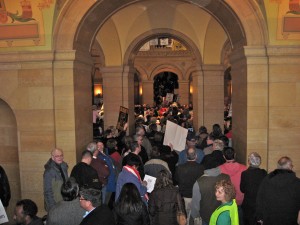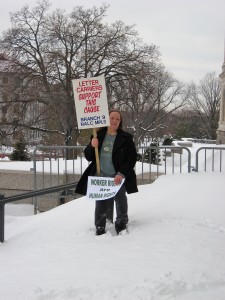#336 – Dick Bernard: Part 6. Our "fellow Americans", Corporate personhood and the Wealthy American
Feb. 22, as the debate continued to rage about Wisconsin public employees and the right to bargain, I got an e-mail from a 41 year old man, a good friend who is one of those loyal employees who make corporations succeed. He was responding to my blog post of February 21.
I know this young man well: he is hard-working and loyal to the corporation he works for. In many ways he can legitimately claim he’s self-made, overcoming some personal obstacles to achieve moderate success. He despises unions largely because his Dad’s union – his Dad was a public school service employee – was headed by someone even I knew to be somewhat notorious and disreputable back in those days. I’ve gathered that my friend had some struggles in school, and didn’t get the help and encouragement he needed then. During the time I’ve known him he attacked and essentially conquered a serious learning disability, on his own, I think. He’s not high on public schools. All of these things seem to be his armor against what he seems to feel are lesser beings who need unions. His apparent attitude: real people, like he is, attack their problems and succeed on their own. (He knows my job for many years was representing people in these very unions.)
In his e-mail to me, Tuesday morning, he said this: “Just saw the news about John Deere and Cat[erpillar] moving the small equipment production to China by 2012. The unions will lose about 20,000 jobs in the Midwest (Iowa and Minnesota). No word from the unions and how they are partnering with business to keep the jobs in the States. This is an issue that’s getting some heat, finally…is the union involved with bus driver/busing issues? I know the cost of diesel fuel is forecast to be $4.25 to $5/10 during the 2011-2012 school year. Any cost containment proposal from the union leaders?”
I responded at considerable length to the questions, knowing that the response would fall into something of a ‘black hole’ of non-acknowledgment that I might know something as someone who’s ‘been there, done that’ and is 30 years his senior. In very brief part, I noted “sometimes I wonder what the companies think their responsibilities are (other than to the very rich people who are the major shareholders.)” They have fought hard, after all, to be considered persons just like my friend and I, and they’ve succeeded. Against me, they’re far bigger than Goliath, but “persons”, every one of them. Unions are pesky inconveniences.
Tuesday afternoon I went to the union rally at the Minnesota State Capitol. Compared with other assorted rallies I’ve been to, this one was huge and extraordinarily high energy. I wrote about my experience there, yesterday.
Wednesday morning I read, as I always do, my copy of the Minneapolis Star Tribune, the state’s major newspaper. I expected there would be something significant about the rally in the paper. There was almost nothing – a paragraph buried in another article. This had nothing to do with newspaper deadlines, or interest in conflict. The same paper was full of stuff about Wisconsin, and Libya and other uprisings. Minimizing the news about what was happening at the Capitol was a deliberate editorial choice.
I always read, first, the editorial and opinion pages of the “STrib”. This day was a long column by the papers editorial page editor D. J. Tice. It speaks for itself. It is about another 40-or-so year old, a member of Minnesota’s mobile elite: some apparently successful guy who can hold governments hostage by not-so-idle threats to move to more favorable places, as he decides*.
I thought of my comment to the other 41 year old I know (see above). I’m going to send Tice $5 as a contribution to his friends plane fare to help that guy get out of Minnesota if he wants to leave. After all, it’s suggested that I can’t count on this greedy person for support of a strong state. He’s self-made and maybe self-obsessed.
I believe the big-shots, like the Koch brothers, Scott Walker et al (linked is the YouTube of the now famous conversation between a Koch impersonator and Gov. Walker, Part I of 2), know that there are short and long-term consequences to their actions to bludgeon workers into submission. But lust for power and greed are powerful drivers.
It will be beleaguered and underpaid and under-appreciated workers who will have to stand up and be counted in the coming days.
I’m there in solidarity with them.
Previous posts on this topic on February 17, 18, 21, 22, 23.
I am sure there will be a Part 7 to this series. And maybe more.
* – Doug Tice’s commentary reminded me of another Star Tribune column I read over 17 years ago. It was headed “How will future reckon with Cousin Kenneth” and is Cousin Kenneth ’93 STrib001. I don’t know how Cousin Kenneth has fared, overall, these past 17 years. It would be interesting….






